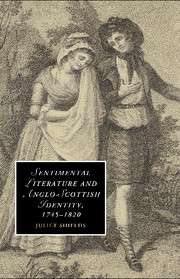Book contents
- Frontmatter
- Contents
- Acknowledgments
- Introduction: The politics and sentiments of union
- 1 The Ossian controversy and the racial beginnings of Britain
- 2 British masculinity and Scottish self-control
- 3 Sentimental correspondences and the boundaries of British identity
- 4 National tales and the domestication of the Scottish Highlands
- 5 Rebellions and re-unions in the historical novel
- Notes
- Bibliography
- Index
- CAMBRIDGE STUDIES IN ROMANTICISM
2 - British masculinity and Scottish self-control
Published online by Cambridge University Press: 06 August 2010
- Frontmatter
- Contents
- Acknowledgments
- Introduction: The politics and sentiments of union
- 1 The Ossian controversy and the racial beginnings of Britain
- 2 British masculinity and Scottish self-control
- 3 Sentimental correspondences and the boundaries of British identity
- 4 National tales and the domestication of the Scottish Highlands
- 5 Rebellions and re-unions in the historical novel
- Notes
- Bibliography
- Index
- CAMBRIDGE STUDIES IN ROMANTICISM
Summary
James Boswell described his battle with hypochondria or melancholy by invoking Ossian: “I have said to the Demon of Hypochondria, as the bold Highlander in Fingal says to his Deity of fanciful conjecture, ‘Show thyself to me, and I will search thee with my spear.’” In comparing himself to the “bold Highlander,” Boswell claimed a courageous self-command that he seems to have felt rarely; indeed, his bouts of what George Cheyne's 1733 treatise on nervous disorders termed “The English Malady” often left him feeling less than heroic. Thus, during his year-long stay in Utrecht, Boswell attempted to contain his frequent spells of depression by urging himself to “be manly.” Boswell later described the symptoms of hypochondria as “a disordered imagination” – the Highlander's “fanciful conjecture” – fretfulness, gloom, a reluctance to activity or exertion, and a tendency to violent passions. That these feelings were real is unquestionable, but that Boswell strategically and rhetorically manipulated them to shape various public personae from the blackguard to the man of feeling is equally undeniable. One of Boswell's acquaintances noted that his accounts of his melancholy were “so laconic and sententious that had I not been too well convinced of the reality of your complaint, I should certainly have taken it for an ingenious essay upon what a man may feel in that unaccountable malady.” In attempting to compose his mind, Boswell also composed his identity, engaging in an “inveterate parasitism on the lives and personalities of others” as he tried on diverse personae.
- Type
- Chapter
- Information
- Publisher: Cambridge University PressPrint publication year: 2010



